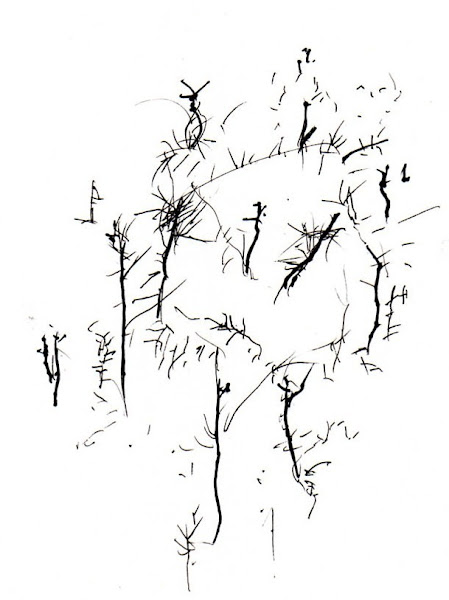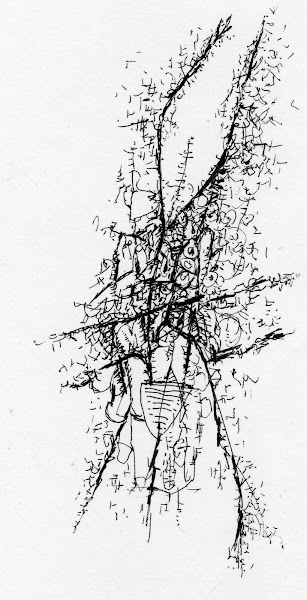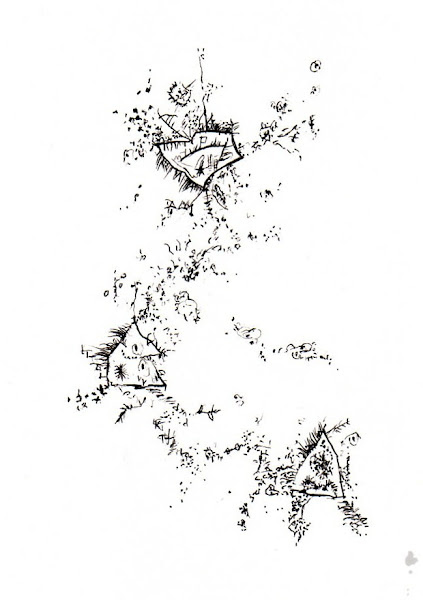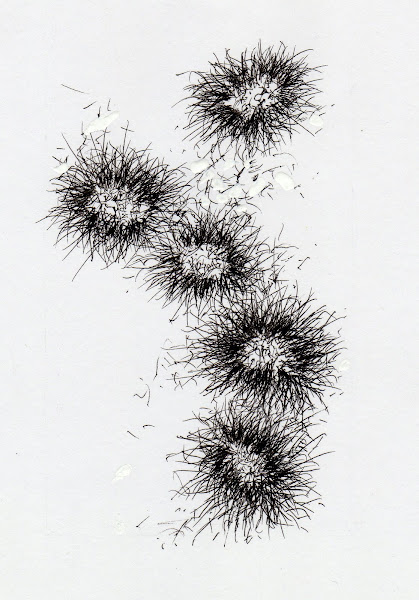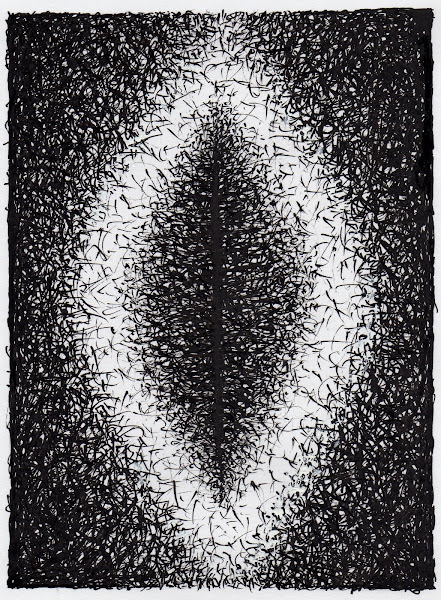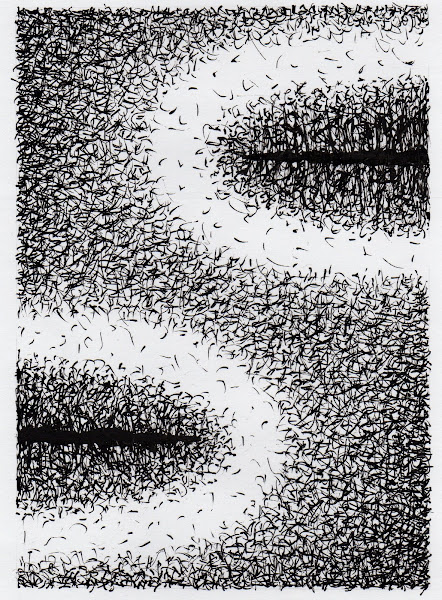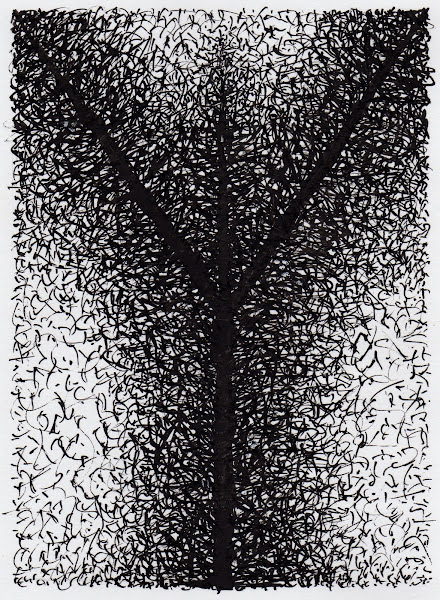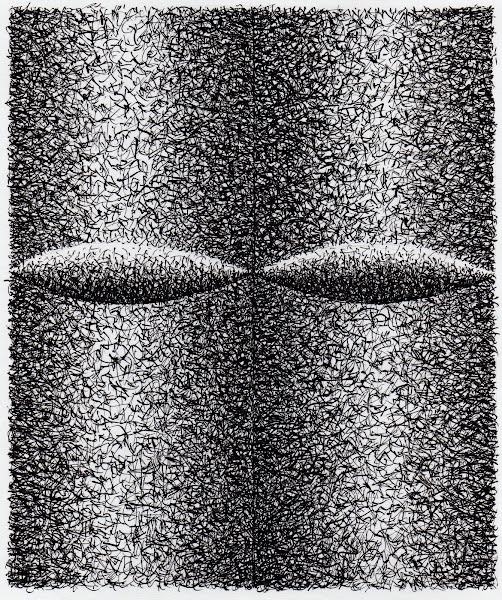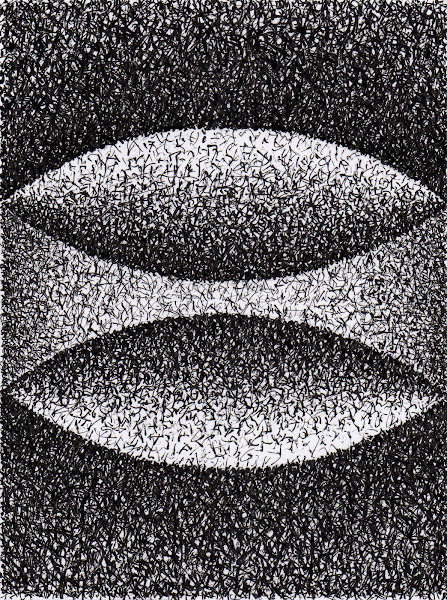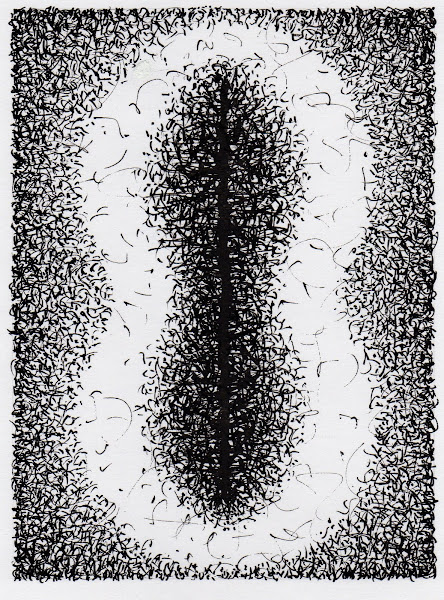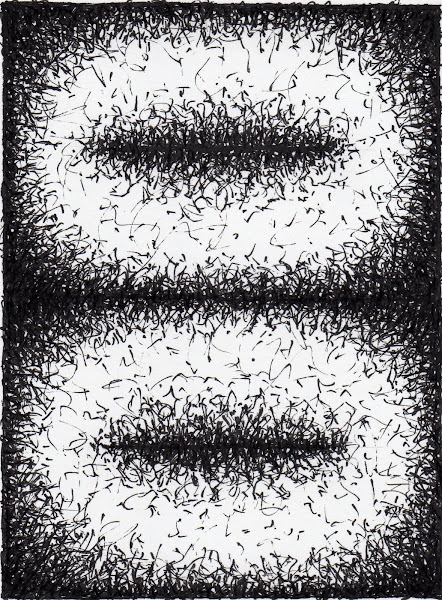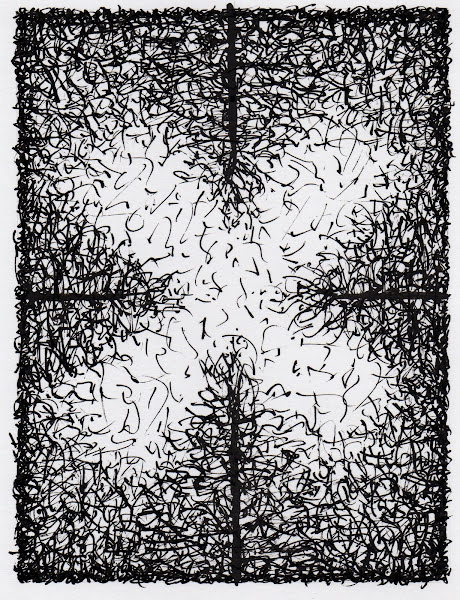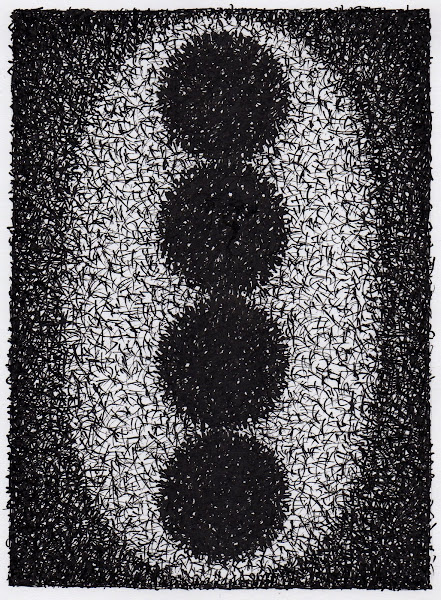.
Moonlit night
cutting across shapes of trees
cry of a fox
My haiku above, was chosen as Second from amongst all haiku submitted to KO Magazine, Autumn-Winter, Spring-Summer issues, by Koko Kato editor. First place taken jointly by James Kirkup and H.F.Noyes, both of whom died this year. The poems were read at the 29th Haiku Gathering held by the Ko Poetry Association Nagoya City.
James Kirkup's and H.F.Noye's joint first place works were as follows....
Half moon drenched in stars
slowly sinking out of sight
in covers of clouds
and
Season's end---
all the autumn colours
in one leaf
.
Saturday, 6 November 2010
Sunday, 13 June 2010
haiku sequence from Blithe Spirit vol 20 no2
.
Hoops within Hoops
(for Isao Ohnishi, Lacquer Bowl Master)
bamboos shade
boards season
rain penetrates
sharpness of a blade
hair split falls
snow settles
plane set
tissues of grain
coil from the edge
slats soak
become hoops
the mindful eye
rings of grain
each inch
his life
hoops split
through each
a whorl of sun
rice cleaves
steel pares the brush
of her hair
circles smoothed
each simple gesture
of the hands
orders of tools
radiate from
his centre
a form refines
spins hoop by hoop
the test of sun
lacquer tree
bleeds summer
into the bowl
dark resin filters
in china’s whiteness
he reflects
a river flows
dark red
over the vessel
lacquer replaces oil
oil replaces lacquer
brush circles the rim
with speed
a surface crumples
his ageing skin
hoops within hoops
wares gather spirit softness
deepens time
The Japanese cedar is remarkably stable and has the straightest grain, cut and seasoned it waits to be split, scribed and planed by the master. His tools are hand made from bamboo, the finest steel and human hair. He sits cross legged surrounded by them. The planed hoops, glued by rice paste and clamped by bamboo, are sanded by charcoal, to fit inside each other perfectly, and tested by holding to the sun. They hang in the workshop to dry for many years.
The master finally assembles them one inside another, they are planed inside and out, into the shape of the vessel, constantly refined until perfect.
The lacquer tree is tapped and filtered into porcelain; the brush he uses is made from human hair, lacquer flows over the bowl, the bowl spins on his hand. He regrinds and relacquers it many times, until the depth glows. There is no hurry; the surface can crumple in an instant.
With time the colour changes, matures, settles down over the centuries.
bowing many times
bent under the lightness
of his smile
.
Hoops within Hoops
(for Isao Ohnishi, Lacquer Bowl Master)
bamboos shade
boards season
rain penetrates
sharpness of a blade
hair split falls
snow settles
plane set
tissues of grain
coil from the edge
slats soak
become hoops
the mindful eye
rings of grain
each inch
his life
hoops split
through each
a whorl of sun
rice cleaves
steel pares the brush
of her hair
circles smoothed
each simple gesture
of the hands
orders of tools
radiate from
his centre
a form refines
spins hoop by hoop
the test of sun
lacquer tree
bleeds summer
into the bowl
dark resin filters
in china’s whiteness
he reflects
a river flows
dark red
over the vessel
lacquer replaces oil
oil replaces lacquer
brush circles the rim
with speed
a surface crumples
his ageing skin
hoops within hoops
wares gather spirit softness
deepens time
The Japanese cedar is remarkably stable and has the straightest grain, cut and seasoned it waits to be split, scribed and planed by the master. His tools are hand made from bamboo, the finest steel and human hair. He sits cross legged surrounded by them. The planed hoops, glued by rice paste and clamped by bamboo, are sanded by charcoal, to fit inside each other perfectly, and tested by holding to the sun. They hang in the workshop to dry for many years.
The master finally assembles them one inside another, they are planed inside and out, into the shape of the vessel, constantly refined until perfect.
The lacquer tree is tapped and filtered into porcelain; the brush he uses is made from human hair, lacquer flows over the bowl, the bowl spins on his hand. He regrinds and relacquers it many times, until the depth glows. There is no hurry; the surface can crumple in an instant.
With time the colour changes, matures, settles down over the centuries.
bowing many times
bent under the lightness
of his smile
.
Saturday, 3 April 2010
Little Haiku Contest 2010 International Year for the Rapprochment of Cultures
.
Idly reading 'Blogging Along Tobacco Road' I found the results of the above, eleven equally placed results judged by Boris Nazansky, in which I was surprised to find one of mine, so here it is.
Keralan roadside
under dry palm fronds
grandmothers break stone
Later, on other sites, second runner up in the Ukiah Haiku International section, judged by Jane Reichold, with
second hand book
a place still kept
by the lacewing
and one of the runners up for the Snapshot Callender with
overhead whistling
quietly the gap
in a rook's wing
.
Idly reading 'Blogging Along Tobacco Road' I found the results of the above, eleven equally placed results judged by Boris Nazansky, in which I was surprised to find one of mine, so here it is.
Keralan roadside
under dry palm fronds
grandmothers break stone
Later, on other sites, second runner up in the Ukiah Haiku International section, judged by Jane Reichold, with
second hand book
a place still kept
by the lacewing
and one of the runners up for the Snapshot Callender with
overhead whistling
quietly the gap
in a rook's wing
.
Sunday, 17 January 2010
.
Haiku Sequence from Blithe Spirit Spring 2010
one of those nights
she comes back down blanketed
to view the stars
obscurity wells up
around us immutable
light years made clear
new moon's cusp
cuts free from shreds
white veil
side by side against
failing sight brightness fades
falls a meteorite
.
Hill
there is something in the hill
rising out of the hill into the sky
an echo of the road ahead
swirls into emptiness
the post holding up the rusting wire
hollowed by decay...a temporary home
for ancient lichens skilled in waiting
who placed the wire and bent each nail
who spaced it with such deliberation
against the rough and natural flow
of grasses that somehow rain and sun
have perfectly refined...put straight
the rusting and the rot the bent hinge
that barely holds the fallen gate
there is no tide here on the river
just wind and rain and moon
yet at the edge exposed a line
where things from neither world exist
a leaf floats by a stone half wet half dry
prints out its time...cast in the sand
a moment by the red water
by the curve that holds the course
the place where neither world exists
the edge rising up the bridge between
infinitely thin...infinitely distant
infinitely close
.
Haiku Sequence from Blithe Spirit Spring 2010
one of those nights
she comes back down blanketed
to view the stars
obscurity wells up
around us immutable
light years made clear
new moon's cusp
cuts free from shreds
white veil
side by side against
failing sight brightness fades
falls a meteorite
.
Hill
there is something in the hill
rising out of the hill into the sky
an echo of the road ahead
swirls into emptiness
the post holding up the rusting wire
hollowed by decay...a temporary home
for ancient lichens skilled in waiting
who placed the wire and bent each nail
who spaced it with such deliberation
against the rough and natural flow
of grasses that somehow rain and sun
have perfectly refined...put straight
the rusting and the rot the bent hinge
that barely holds the fallen gate
there is no tide here on the river
just wind and rain and moon
yet at the edge exposed a line
where things from neither world exist
a leaf floats by a stone half wet half dry
prints out its time...cast in the sand
a moment by the red water
by the curve that holds the course
the place where neither world exists
the edge rising up the bridge between
infinitely thin...infinitely distant
infinitely close
.
Wednesday, 6 January 2010
Second Prize in the Winter Moon Awards for Haiku 2009
her sixty fifth
she shows us a rare iris
deeply veined
and Carolyn Thomas's commentary...
"Before I looked up the names of the winning poems (they are always chosen blind) I thought a woman had penned this one,and I saw her as the subject. It feels that personal. I was surprised to discover a man had written it. I had to then read it from a different perspective, a strongly poetic one because 'he' sees the beauty, the connection, between the rare iris and the woman who has lived life. Now I have the choice of two options....
I choose to experience this haiku as I originally read it because it evokes the deepest emotion from me. Here is an older woman appreciating who she is, honouring her life's journey; she knows she is the rare iris deeply veined. She says to everyone in her world, "This is who I am."
.
.
Third prize in the Klostar Ivanic 2009 International Haiku Contest
in the market
only the beggar's dog
stares at the eyes
na trznici
samo prosjakov pas
gleda u oci
Commentary, translated by Prof Vida Pust Skrgulja.
An excellent haiku! It is not difficult to imagine a man who had experienced defeat, a man completely broken by his way of life. Our experience lets us know the fact that such people can't look into other people's eyes any more. There are many reasons of that - feeling shame, fear, pain, being hurt, rejected, inferior. Animals (in this case a dog) do not suffer from such negative feelings. They know by instinct that everything that happens in their life is OK. They are direct, sincere, always having the strength to look into the eyes, and search for help. This haiku is excellent just because the beggar is only mentioned, while the accent has been put on the dog (having positive feelings)
.
.
her sixty fifth
she shows us a rare iris
deeply veined
and Carolyn Thomas's commentary...
"Before I looked up the names of the winning poems (they are always chosen blind) I thought a woman had penned this one,and I saw her as the subject. It feels that personal. I was surprised to discover a man had written it. I had to then read it from a different perspective, a strongly poetic one because 'he' sees the beauty, the connection, between the rare iris and the woman who has lived life. Now I have the choice of two options....
I choose to experience this haiku as I originally read it because it evokes the deepest emotion from me. Here is an older woman appreciating who she is, honouring her life's journey; she knows she is the rare iris deeply veined. She says to everyone in her world, "This is who I am."
.
.
Third prize in the Klostar Ivanic 2009 International Haiku Contest
in the market
only the beggar's dog
stares at the eyes
na trznici
samo prosjakov pas
gleda u oci
Commentary, translated by Prof Vida Pust Skrgulja.
An excellent haiku! It is not difficult to imagine a man who had experienced defeat, a man completely broken by his way of life. Our experience lets us know the fact that such people can't look into other people's eyes any more. There are many reasons of that - feeling shame, fear, pain, being hurt, rejected, inferior. Animals (in this case a dog) do not suffer from such negative feelings. They know by instinct that everything that happens in their life is OK. They are direct, sincere, always having the strength to look into the eyes, and search for help. This haiku is excellent just because the beggar is only mentioned, while the accent has been put on the dog (having positive feelings)
.
.
Subscribe to:
Posts (Atom)


